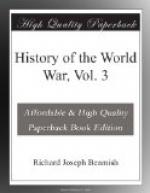[Illustration: Where Earl Kitchener met his death]
The British Admiralty, after investigation, gave out a statement declaring that the vessel struck a mine, and sank about fifteen minutes after.
The news of Lord Kitchener’s death shocked the whole Allied world. He was the most important personality in the British Empire. He had built up the British army, and his name was one to conjure by. His efficiency was a proverb, and he had an air of mystery about him that made him a sort of a popular hero. He was great before the World War began; he was the conqueror of the Soudan; the winner of the South African campaign; the reorganizer of Egypt. In his work as Secretary of War he had met with some criticism, but he possessed, more than any other man, the public confidence. At the beginning of the war he was appointed Secretary of War at the demand of an overwhelming public opinion. He realized more than any one else what such a war would mean. When others thought of it as an adventure to be soon concluded, he recognized that there would be years of bitter conflict. He asked England to give up its cherished tradition of a volunteer army; to go through arduous military training; he saw the danger to the Empire, and he alone, perhaps, had the authority to inspire his countrymen with the will to sacrifice. But his work was done. The great British army was in the field.
CHAPTER V
THE RUSSIAN CAMPAIGN
In the very beginning Russia had marked out one point for attack. This was the city of Cracow. No doubt the Grand Duke Nicholas had not hoped to be able to invest that city early. The slowness of the mobilization of the Russian army made a certain prudence advisable at the beginning of the campaign. But the great success of his armies in Lemberg encouraged more daring aims. He had invested Przemysl, and Galicia lay before him. Accordingly, he set his face toward Cracow.




